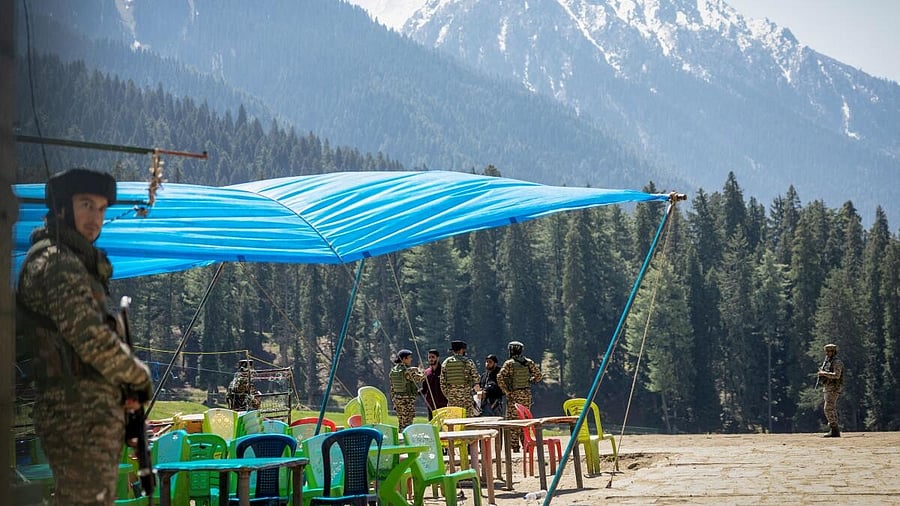
Indian security force personnel talks to the local people at the site of a suspected militant attack on tourists in Baisaran near Pahalgam.
Credit: PTI Photo
Srinagar: As the nation grieves the loss of 26 civilians in a brutal terror attack in Pahalgam, concerns are mounting over the adequacy of security arrangements in one of Kashmir's most frequented tourist destinations.
The incident occurred in Baisaran Valley, a scenic location near Pahalgam in south Kashmir’s Anantnag district, where tourists from across the country had gathered during the holiday season.
In a closed-door all-party meeting, the central government has reportedly acknowledged security lapses surrounding the attack. Meanwhile, stakeholders in Kashmir’s tourism sector claim that no advisories or alerts were issued by the administration ahead of the peak tourist influx.
A local hotelier in Pahalgam, speaking on condition of anonymity, revealed that Baisaran Valley had been opened to tourists on April 20—just two days before the attack. “Typically, Baisaran valley becomes accessible only in June, particularly for Amarnath pilgrims. Why it was opened so early this year remains unclear,” he said.
During the annual Amarnath Yatra, Pahalgam and its surrounding areas are usually placed under stringent security cover, making any terror activity highly unlikely. However, the hotelier pointed out that no security personnel were present in Baisaran when the attack occurred, raising serious concerns over administrative oversight.
Mehraj Din, a pony ride operator in the area, described a complete absence of security on the route to Baisaran. “There were no checkpoints, no patrols—nothing. Tourists were left to fend for themselves. This is an inexcusable failure. If the government cannot guarantee the safety of innocent tourists, it has no business promoting a narrative of normalcy,” he said.
A Srinagar-based tour operator echoed similar sentiments, criticising what he called a politically motivated projection of normalcy.
“This tragedy highlights the dangers of complacency. The government has been using tourism to showcase peace, but this attack exposes the fragile ground beneath that narrative. It’s time to reassess and ensure that such declarations are backed by genuine security measures,” he said.
The attack has not only shattered the illusion of calm in Kashmir but has also raised pressing questions about preparedness and accountability at a time when the Valley is being promoted as a safe destination for visitors.